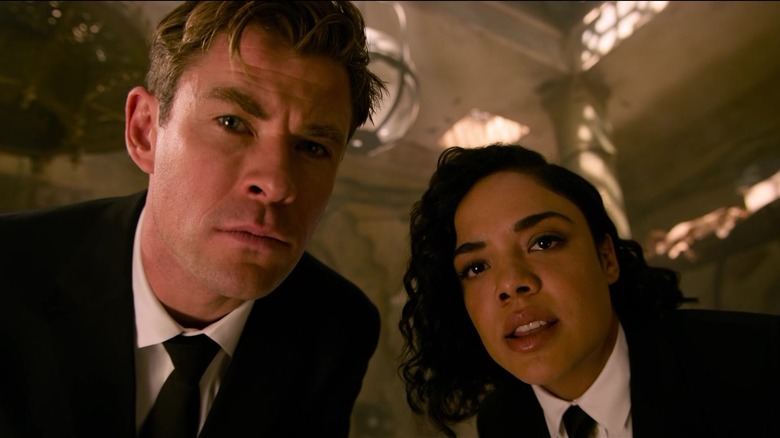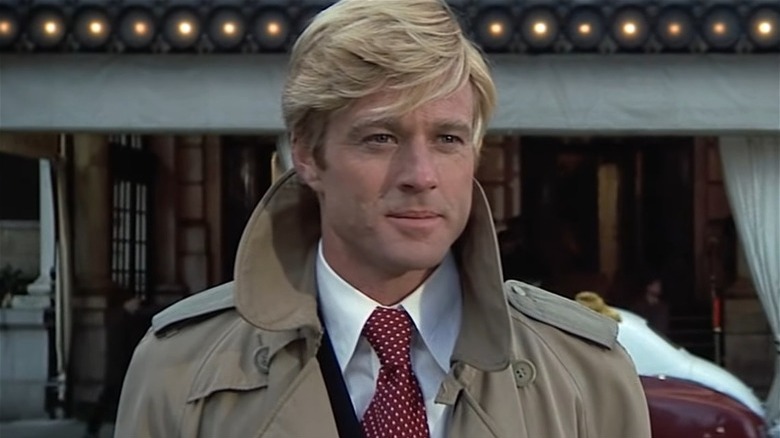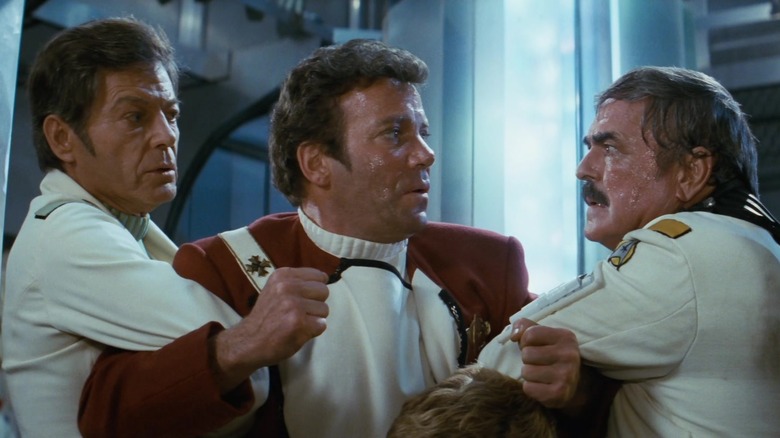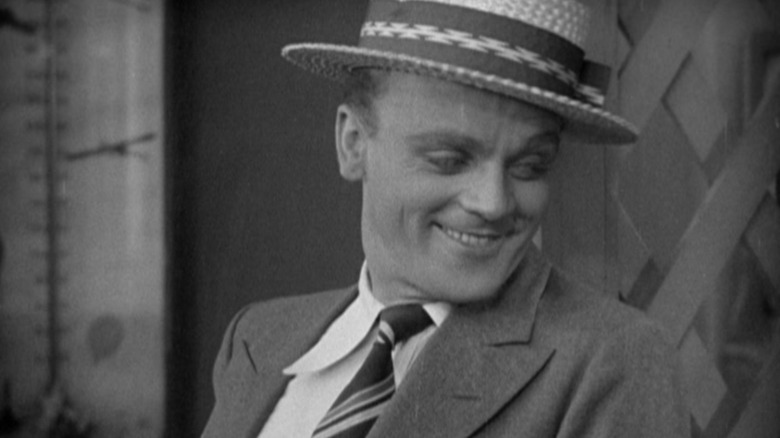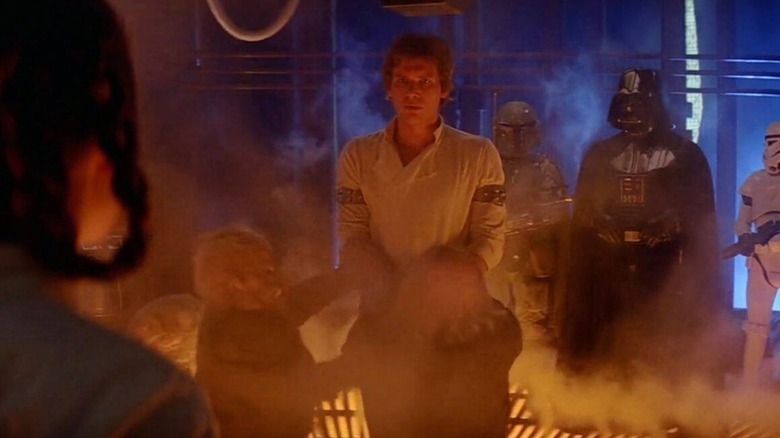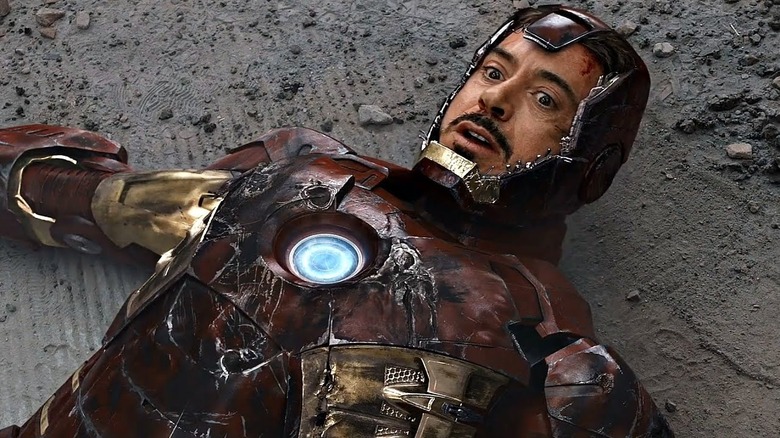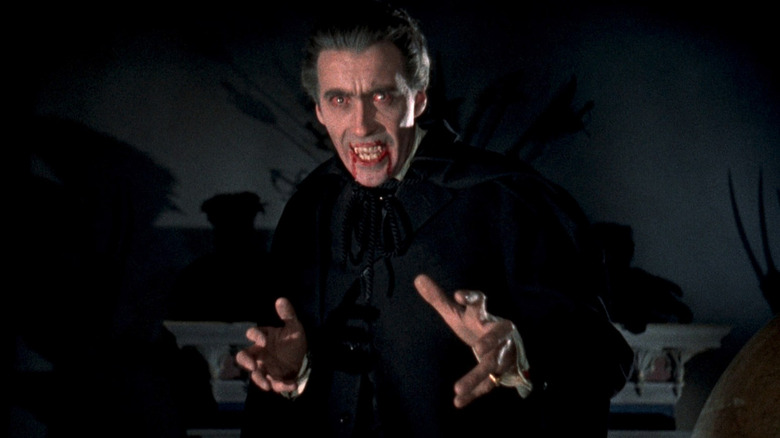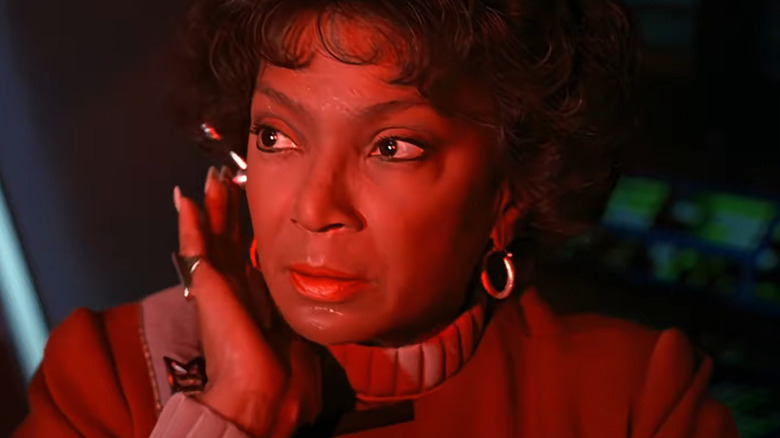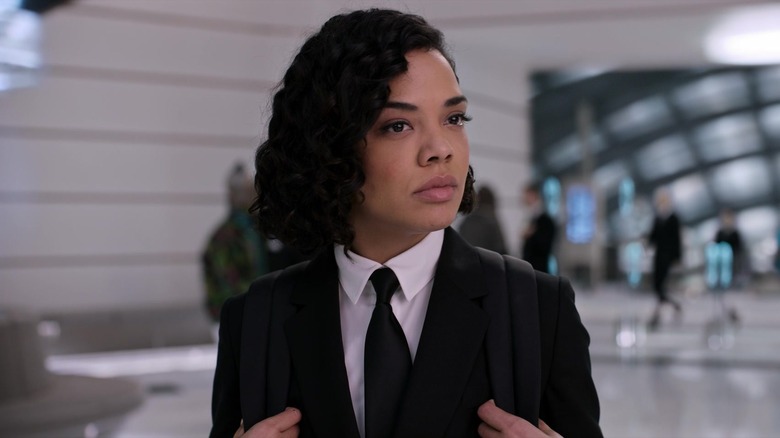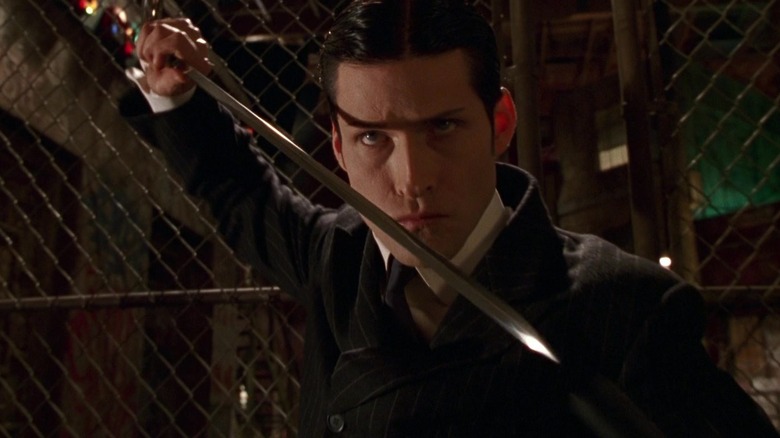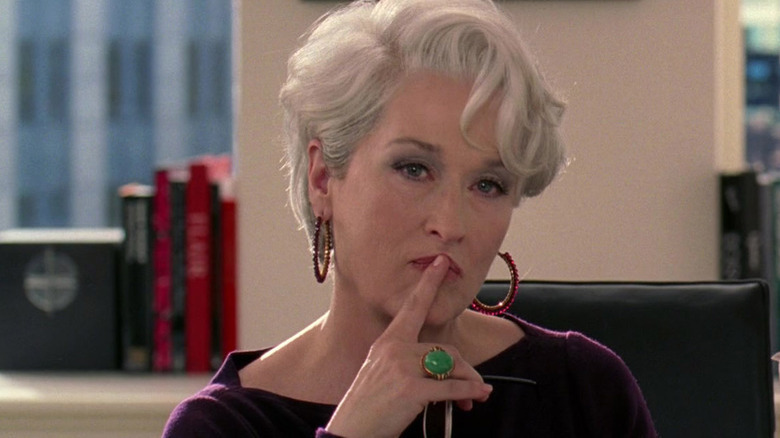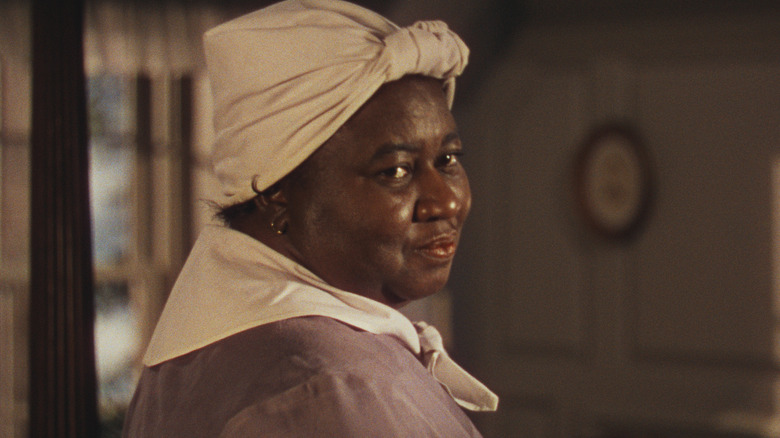Movie Lines That Actors Refused To Say
With but a scant few exceptions, writers might be the most critical part of the behind-the-scenes process, their scripts the most important elements of a film. Scripts are often seen as the sacred scrolls of the filmmakers, only to be altered with the most careful consideration and delicate touch. After all, studios spent vast amounts of money developing scripts through various rewrites to get things just right and ensure a quality story.
Any changes that are made to a script during production, though, are typically done by the director, whose role is to shepherd that script to the screen. But it's ultimately the actors in front of the camera who interpret those written words, and not every on-screen performer is happy to simply recite what's on the page. It's not uncommon for an actor, in fact, to discuss dialogue with a director or even the scriptwriter to reach a place where they feel comfortable in their performance.
On rare occasions, though, there is an actor who shows a sense of grand defiance, outright refusing to say what's been written for them. Often it's a major superstar using their clout to do what they think is best for the story. But sometimes it's a relative newcomer with little power but no less a sense of what might work best. From iconic lines that replaced dialogue that wasn't quite good enough to actors who insisted on changing entire scripts, here's a list of movie lines that actors flat-out refused to say.
Robert Redford wouldn't talk about his lack of skills
Directed by Sydney Pollack, "The Way We Were" remains one of the most beloved romantic dramas of all time. It starred Barbra Streisand, who had to convince superstar Robert Redford to join her in the film after he turned the role down twice. Eventually, the pair came together to tell the story of a Jewish anti-war activist (Streisand) who, despite their differences, falls in love with Redford's politically disinterested goy (look it up).
During the film, things get hot and heavy between the two stars, and there's a love scene that originally included a line in the script that Redford wouldn't utter. In his book, "The Way They Were: How Epic Battles and Bruised Egos Brought a Classic Hollywood Love Story to the Screen," author Robert Hofler talks about the movie's first intimate scene that proved difficult to film, and a big reason was Redford's refusal to tell Streisand's character "It'll be better this time" as he proceeds to go for another round in bed. According to Hofler, Redford had remarked that he was never bad in bed, so there's no way his character would be. It's possible that Redford, one of the era's biggest stars, feared that the line would damage his reputation as a strong, virile man whom the ladies adored.
DeForest Kelley didn't want his most iconic line in The Wrath of Khan
After the lackluster response to "Star Trek: The Motion Picture" in 1979, its sequel could be seen today as the movie that saved the franchise. With a bold new look and a brilliant new director in Nicholas Meyer, "The Wrath of Khan" became an instant classic. The film delivered action, adventure, and one heartbreaking moment that shook fans to their core: the death of Mr. Spock, played unforgettably by Leonard Nimoy.
Spock's sacrifice to save the Enterprise is one of the most heartbreaking deaths in movie history, thanks partly to the gutwrenching reaction of William Shatner, held back by Scotty actor James Doohan, who declares, "He's dead already." But that line only exists because DeForest Kelley — who played Dr. McCoy — refused to say what was scripted. As described in "From Sawdust to Stardust," a biography of DeForest Kelley, McCoy was to have told Kirk "He's dead, Jim," a reuse of the character's iconic catchphrase.
It might seem like a strange refusal since he'd said it so many times before, but there's some Vulcan logic to it. According to the story, Kelley worried that the line had become so overused that it was now something of a comedic punchline, and he felt it might elicit unintended laughter during the film's most powerful scene. In the final cut, McCoy gets his own emotional line, though, warning Kirk not to enter the engine chamber to help his best friend because doing so would flood the whole compartment with radiation.
James Cagney's playful jab went unsaid
James Cagney is among the greatest actors of his generation, starring in classics like "The Public Enemy" and "Yankee Doodle Dandy." He was often cast a gangster or a tough guy, and later in his career, he was often typecast in those kinds of roles. But that wasn't yet the case when he filmed "Sinners' Holiday" in 1930. That's because the film was his big screen debut, playing one of two brothers whose mother's boardwalk arcade is a front for a bootlegging operation in the middle of Prohibition.
Though it was his first movie, Cagney wasn't afraid to speak up when he was called upon to deliver a line that he absolutely despised, even fighting with the film's director, John G. Adolfi, over it. The actor himself talked about the one-set kerfuffle in his authorized biography. "There was a line in the show where I was supposed to be crying on my mother's breast," he said. "[Warner Brothers executive Darryl] Zanuck had written the line, and I was expected to say it. It was, 'I'm your baby, ain't I?' I refused to say it. Adolfi said, 'Well, I'm going to tell Zanuck.'"
Even in the face of threats that could jeopardize his entire career, the young actor wouldn't do it. "I'm not going to say that line," he recalled. In the end, he said, "They took the line out." As for those threats, they clearly didn't mean much because Cagney went on to become one of the greatest stars in Hollywood history.
Harrison Ford made up his own famous comeback
By now, pretty much "Star Wars" fan knows the legend: When filming one of the biggest scenes in "The Empire Strikes Back," actor Harrison Ford famously ad-libbed the best line, telling Princess Leia (Carrie Fisher) "I know" instead of "I love you, too." It's a moment that shows just how cool Han really is while melting the hearts of every person in the audience who wishes they were Princess Leia. And it's all thanks to Ford coming up with it right there on the spot.
That story is true, but what some movie buffs may not know is that there was an entirely separate line written for Han Solo as he passed by Princess Leia on his way to be frozen in carbonite. It may also come as a surprise to learn that it wasn't originally "I love you, too." As detailed in the book "The Making of Star Wars: The Empire Strikes Back," the scene was to have begun with Leia telling Han, "I love you. I couldn't tell you before, but it's true." Then, Solo was to have looked her way, paused, and responded sternly, "Just remember that, because I'll be back."
During filming, director Irvin Kershner agreed with Ford that the dialogue was a bit too much. Ford rewrote the scene on the spot, coming up with new lines for both characters, and the result became one of the most famous exchanges in the franchise. Ironically, had the scene been filmed as scripted, it might have been Ford who made the phrase "I'll be back" famous rather than Arnold Schwarzenegger.
Robert Downey Jr. nixed Iron Man's final line in Avengers
A superhero team-up that rocked the movie industry in more ways than one, "The Avengers" put the seal on Marvel's cinematic universe. It brought together multiple movie franchises, but there's no question that its biggest star was Robert Downey Jr., who returned as Iron Man. Leading the film, Downey Jr. got the movie's biggest scenes and its best lines. And one of them came right at the end of the film, as Tony Stark asks his teammates if they've ever had shawarma, a popular Middle Eastern street food. But that line is there because the actor hated what he was originally supposed to say.
Famously rewritten by Joss Whedon, erasing an earlier draft by Zak Penn (who's still mad about it), the script had Stark in the aftermath of their victory asking the rest of the Avengers, "What's next?" Downey Jr., though, didn't like the line, and wouldn't say it, insisting that the moment called for something a bit more lively, clever, and fun. In an article in Entertainment Weekly, Whedon says he agreed and spent time jotting down pages and pages worth of alternate lines. But RDJ still wasn't happy.
Though he did include Whedon's revision about an unconscious kiss, the actor went for something wholly of his own creation too, asking if the team wanted to try shawarma. That ad-lib led to the filming of a whole new scene, tacked on after the credits, and it's since become one of the film's signature moments.
Christopher Lee refused to speak any of his vampire dialogue
Screen legend Christopher Lee has had plenty of famous roles, from Saruman in "The Lord of the Rings" and Count Dooku in "Star Wars" to Sherlock Holmes in both the 1960s and '90s. But before them all he made his name as the greatest villain of all time, Count Dracula himself, in the eponymously titled 1958 film "Dracula" (also known as "Horror of Dracula"). A Hammer Horror classic, it's one of Lee's finest performances, as he's able to strike fear into anyone's heart with so much as a fierce glare, barely uttering a word.
Famous for his silence, this version of Dracula wasn't always supposed to be so mum. As Lee described in an on-camera interview with Classic Monsters later in his career, "People all over the world who have seen that film have asked me why I didn't speak. ... The answer is very simple: I hated the script. And the lines were literally un-sayable." For Lee, who was clearly trying to do his best to evoke the feeling of Bram Stoker's original book, the lines he was given weren't faithful to the author's work. "This was a great fight I used to have over the years with Hammer — I kept on saying, 'Why don't you use Stoker's words?'"
Instead of lifting dialogue directly from the novel, though, he said, "Somebody used to write up lines like 'I am the apocalypse.' Ugh — beyond belief." Lee, obviously frustrated, was blunt with producers, saying, "I'm sorry, I'm not saying these lines." And he didn't, and the rest is movie history.
Nichelle Nichols nixed a racist retort in Star Trek VI
Nearly a decade after he helmed "The Wrath of Khan," director Nicholas Meyer returned to "Star Trek" to close out the series, helming "Star Trek VI: The Undiscovered Country." And like his earlier effort, there was one actor who refused to deliver a line of dialogue that didn't work for them. Unlike DeForest Kelley, though, co-star Nichelle Nichols wasn't worried about laughter in the audience.
"The Undiscovered Country" is rife with social commentary, from its Cold War metaphor to comments on racism. Entertaining a group of their interstellar rival Klingons for a state dinner, the crew is nervous, having never dealt with them so personally, and several officers display subtle bias against them. When a scene called for Lt. Uhura (Nichols) to do the same, the actress balked at a line meant to demonstrate that humans still had some prejudice to overcome in the 22nd century.
In William Shatner's book "Star Trek Movie Memories," the actor recalled the moment when Nichols said no. "Uhura as originally scripted would've made reference to the kinder, gentler Klingons by saying something to the effect of, 'Yeah, but would you want your daughter to marry one?'" According to Shatner, Nichols refused to say it, likely because of its obvious parallels to American racism amid the 1960s Civil Rights movement, when interracial marriage was cause for violence.
Tessa Thompson wouldn't repeat a famous line in Men in Black: International
Tessa Thompson seemed to become a superstar overnight. She'd had a pretty solid career into the 2010s, starring in "Veronica Mars" and "Copper," but starting in 2015 she appeared in a string of smash hits, starring opposite Michael B. Jordan in "Creed" and then in the HBO sci-fi thriller "Westworld" before joining the Marvel Cinematic Universe in 2017's "Thor: Ragnarok." So it made perfect sense when Sony was looking to revive the "Men in Black" franchise that they went to Thompson, who stars as Agent M alongside Chris Hemsworth in "Men in Black: International."
But even with her experience in franchises, Thompson had at least one line she wouldn't cross. She refused to read a line for the soft-reboot that was blatant nostalgia. She talked about it in a chat with The Hollywood Reporter, which asked if she would ever speak Will Smith's famous line in the original "Men in Black" film — "I make this look good."
"I wouldn't have said it," Thompson responded flatly. "In fact, I think someone did ask me to — just as an option — and I said no," Thompson acknowledged. "M is just different from that character. ... Yeah, I was really conscious of too much nostalgia." Still, Thompson did admit that callbacks were part of the game. "Inside of that, there were moments when I thought, 'Let's lean in.'"
Crispin Glover refused all of his lines in Charlie's Angels
Most famous for his role as George McFly in "Back to the Future," actor Crispin Glover famously sued Universal Studios when they used his likeness in the sequel. Since then — rightly or wrongly — Glover has had a reputation for being a prickly performer, which hasn't done him any favors when looking for work. One of the most famous stories in his career took place on the set of "Charlie's Angels," the 2000 reboot of the 1970s action TV series.
In the film, Glover was brought on to play one of the movie's villains, a creepy, lanky assassin known only as the Thin Man. But in the studio's first meeting with the actor, Glover made it crystal clear that he hated the lines that the character was given in the script and wouldn't do it unless he could make a huge change. "The dialogue was just expositional," he says he told director McG in that first discussion, according to an interview in The Guardian. But instead of writing new lines to say, Glover had a radical idea: He wanted to play the character as entirely mute.
Instead of speaking his lines as written, Glover opted to say nothing at all, perhaps learning the lesson of Christopher Lee's "Dracula." Because sometimes being completely silent can be even scarier than barking pompous threats or screaming like a madman. Perhaps unexpectedly, McG quickly got behind the idea, and Glover performed the role without ever saying a word.
Meryl Streep tweaked a line in The Devil Wears Prada
Nominated for an eye-popping 21 Academy Awards and taking home the trophy itself three times, Meryl Streep may be among the most talented women to ever grace the big screen. She had her first nomination in 1979 for "The Deer Hunter," and still gained regular nominations nearly 40 years later for films like "Florence Foster Jenkins" and "The Post." With so many accolades, filmmakers, producers, and writers alike have learned to respect her opinion and listen to what she has to say because she's usually going to be right. So when she didn't like a line of dialogue in "The Devil Wears Prada" in 2006, there wasn't much discussion — they did as she wanted.
That moment came during the table read for the film — a process where the actors gather to read the script together, reading out their parts in turn. It's not quite a rehearsal but helps actors, writers, and directors work out the story and dialogue. And Streep had a problem with what eventually became one of the film's famous lines. In a scene where her character, the powerful fashion magazine editor Miranda Priestly — sits in a car with her chauffeur, Andy (Anne Hathaway), she was to have said "Everybody wants to be me." Streep suggested a simple one-word alteration, and the final line as delivered was a somewhat more modest, "Everybody wants to be us."
Hattie McDaniel drew the line at racial slurs in Gone with the Wind
In the 1930s there weren't many famous Black actors and even fewer who were women. But if there was one Black performer whom audiences knew, it was Hattie McDaniel, a trailblazing actor who starred in hundreds of films. In 1940, she became the first Black actor to win an Academy Award (which she sadly accepted in a segregated hotel). She won it for her role as the house servant Mammy in the 1939 classic, "Gone with the Wind."
The Civil War romance that starred Clarke Gable, Vivien Leigh, and Olivia de Havilland, "Gone with the Wind" was a product of its time, with language and themes that have proven problematic in the modern era. To McDaniels' considerable credit, however, she refused to play a part in what might have wound up its most controversial moments if she hadn't allowed it. Because the script didn't just call for Black characters to defend slavery — it also contained multiple uses of the worst racial slurs. Producers argued the slurs brought authenticity and argued it wouldn't be a problem as long as the dialogue was spoken by "better" Black characters. McDaniel wasn't having it.
Despite the massive imbalance in the power dynamic in Hollywood for minorities at the time, the actor stood her ground. Ultimately, she was able to convince the filmmakers to ditch many of the racial slurs.
